NYU Langone Health Expert Dr. Stella Lymberis on coping with the coronavirus pandemic
With a global health crisis and pandemic, now past its percolating point, it seemed like the right time for NEO magazine to feature a story on Dr. Stella Lymberis, a wife and mother of two, a health expert, and radiation oncologist at the Isaac and Laura Perlmutter Cancer Center at NYU Langone. Having received her BS in Chemical Engineering from MIT and a Doctor of Medicine from the Albert Einstein College of Medicine at Yeshiva University, Dr. Lymberis has been a trusted and highly esteemed doctor, researcher, and scientist in the medical profession. Her extensive research and expertise in the field of radiation oncology is an ongoing commitment, with great strides continuously being made in the treatment of gynecological cancers, toward the end goal of finding an effective treatment that will enable cancer patients to live a sustainable life.
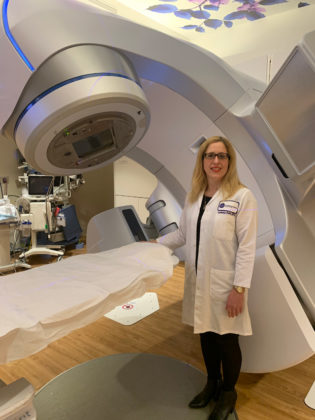
Dr. Stella Lymberis at work, NYU Langone Health Department of Radiation Oncology
In my interview with Dr. Lymberis, I received first hand advice that put whatever “oncoming ills” I was feeling into a much more rational and objective perspective. What I discovered was that this is not a new virus, but a new strain of an existing one. There are already four corona viruses in existence. I also learned that your chances of dying from it are minimal, unless you are in a high risk category. Most people can recover, but it spreads faster and more easily, with a stricter form of containment required. It remains a high risk to the elderly and patients with multiple medical problems, but we are increasingly learning that it may have long-term ramifications to anyone, regardless of risk category or age, that has been exposed to it. As for the race for hand sanitizers that emptied out supermarket shelves, Dr. Lymberis reassured that there are other forms of disinfection that are equally as effective as hand sanitizers, if not more, such as hand washing with soap or alcohol, and cleaning surfaces with diluted bleach. This does not mean hand sanitizers are ineffective, but Dr. Lymberis emphasized that we must resist mass panic and consumerism and focus on common sense, simple guidelines that can help prevent the spread. The advice given from an experienced healthcare professional was not to panic, but to continue practicing proper hygiene habits that can help contain and stop the spread. Her message was also one of support, emphasizing self care, a healthy diet and exercise, and stressed that we must have a balanced emotional response to the daily uncertainties and changes in our lives due to the pandemic.
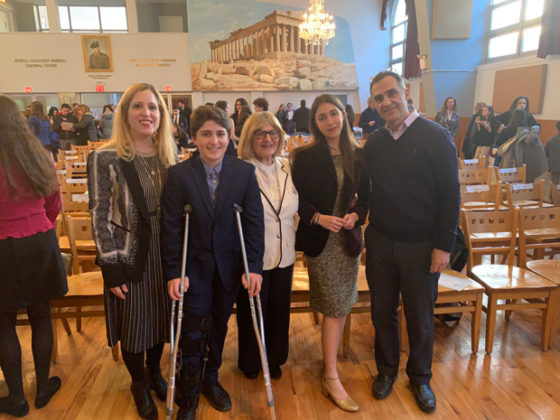
The Latoussakis family at the Ellinomatheia Award Ceremony celebrating the awards for their children on exams. From left, Stella with son Michalis, mother Dionisia Lymberis, daughter Olga and husband Michalis Latoussakis
Apart from being a medical professional immersed in her work with great passion and compassion, constantly studying and keeping abreast of developments in the health industry, Dr. Lymberis is a voice for women and Hellenism. Over the past few weeks she mobilized action in support of Greece and was a proud supporter of the HALC #StandWithGreece campaign and the migrant awareness effort organized by the Northern Aegean Relief Alliance. Stella biked from Manhattan to Astoria (in an effort to reduce exposure on the subway) with her husband last week to attend the Migrant Crisis Awareness Rally on March 8th in Astoria. Suspecting that the planned Greek Independence Day parade would likely be cancelled she realized that the time to support Greece in a group or rally would soon be running out, and with her hand sanitizer in her pocket she was in attendance, proudly wearing a large Greek flag draped around her back.
When Stella is not in her lab coat, you may have experienced her choral talent at a concert, like the 2015 Greek Cultural Center’s concert dedicated to Mikis Theodorakis. If you haven’t heard her sing, you may have danced with her in an island sirto or pentozali at one of many events in the Greek community. Dr. Lymberis is trained in voice, piano, and Greek traditional dance performance, and enjoys and supports Greek cultural events with friends and family. She is incredibly saddened by the constant cancellation of cultural events and hopes that we can mobilize support for our Greek artists and businesses that find themselves without venues and work. Now, more than ever, she believes we all need the arts to help us cope with the challenges posed by the pandemic by listening to music or sharing literature, poetry, and art to express our feelings of fear and isolation and help ourselves and each other heal.
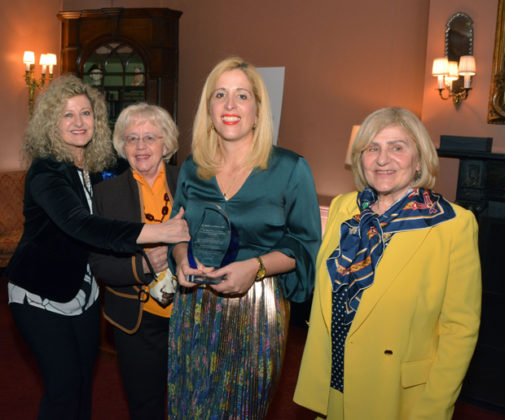
Stella receiving the AGAPW Woman of the Year Award 2019 from President Olga Alexakos (1st from left). Also in photo her mother Stella Lymberis. Photo: ETA PRESS
The one attribute that stood, apart from her contributions to the medical profession, is her compassion, dedication, and humility. Her investment in her work is a labor and discipline of love. She is a woman who inspires trust and can chorale a group into action. Stella Lymberis is married to Dr. Vassilios Latoussakis, a psychiatrist at Gracie Square Hospital, who specializes in geriatric psychiatry and is a proud mother of two children, Olga and Michalis.
Coronavirus. How is this different from the flu and should we be more concerned about it?
Don’t get me started on this question because the dismissive conversations and reassurance at the beginning of the epidemic were deeply irresponsible and aggravates me personally as a doctor. Covid-19 is NOT the flu and everyone must take this infection seriously and show personal responsibility to limit spread. This cannot be emphasized enough. It is irrelevant to discuss and compare flu cases to the infectious and lethality risk from Covid-19.
It is different from the flu mainly because it is a novel version of coronavirus for which we do not currently have antiviral therapies nor a vaccine that will prevent infection. COVID-19, as compared to the flu, is also extremely contagious and easily spread from person to person via droplet spread or from solid surfaces an infected person can touch and be exposed to. We have seen how super spreaders congregating in conferences, ski resorts and cruises have brought us to a global pandemic situation. It infects the lower portion of both lungs, causing bilateral pneumonia which results in dyspnea, the difficulty of breathing, and in vulnerable populations, with either suppressed immune systems or other medical problems, it can lead to inability for the lung to properly provide oxygen to the body. At that time the patient may need oxygen. or if things get worse, may need to be incubated on a ventilator in order to stay alive. Another worrisome finding is that for some patients who recover from infection they may be left with scarring and reduced lung function. This disease does not only affect the elderly. We are learning that almost half of cases are middle aged patients. Also concerning is the fact that this virus can also result in direct cardiac toxicity causing cardiomyopathy.
We cannot simply say that Covid-19 is simply the flu and everything will be alright. Politicians early on took that approach to protect the markets and that was deeply irresponsible. We all need to take the necessary steps to minimize disease spread and take this matter very seriously.
Stay at home means stay at home period – for your own good and for the good of others.
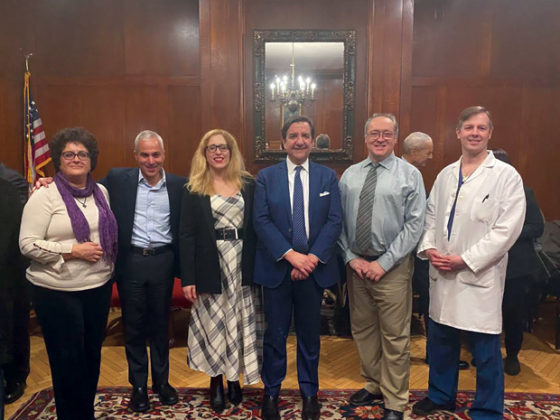
Hippocratic Conference at Lenox Hill with Dr Stella Lymberis, Dr Manolas President of Hellenic Medical Society (3rd from left), Cathy Economou, and Michael Plakogiannis, MD far right.
Do you remain that hopeful that a vaccine will be developed soon?
Yes, I am very hopeful that technology and medical innovation will see humanity through this crisis. Just this week three pharmaceutical companies have launched the first human clinical trials of experimental COVID-19 treatments. On of these companies, which is already working on a vaccine for SARS and MERS, other members of the coronavirus family, managed to administer the vaccine to the first patient on March 16, 2020. About 45 participants will be enrolled within six weeks and given two doses of the vaccine in the upper arm about 28 days apart. They will be monitored for a year after the doses.
I was most inspired to hear the testimony of the first person to receive a dose of the potential vaccine, the 43-year-old Jennifer Haller, an operations manager at a small tech company in Seattle. She and all patients who enroll in clinical trials in order to advance medicine are the true heroes and are an inspiration to us all. Without them medical advances cannot be made.
Another well-known prominent Greek-American scientist is leading another treatment effort against severe forms of COVID-19 infection, George D. Yancopoulos, M.D., Ph.D., Co-founder, President and Chief Scientific Officer of Regeneron, is leading another treatment effort against severe forms of COVID-19 infection. We all pray for the brilliant scientists in the US and around the world along with brave patient participants in clinical trials who will help us make progress in order to fight the battle against this disease.
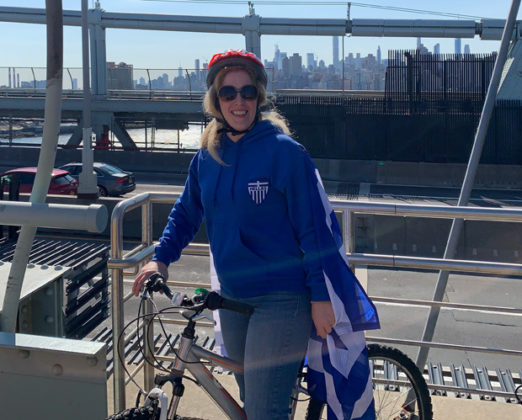
Stella biking to Migrant Crisis Northern Aegean Alliance Rally from Manhattan to Astoria to avoid subway crowds due to covid outbreak
How has coronavirus affected your work as a doctor?
This is a one in a lifetime situation that is affecting all of us dramatically everywhere at work and at home. As the first cases of COVID-19 hit NYC, the inevitable suddenly became real. NYC is an international multi-ethnic city with people traveling around from all over the world. As a doctor and engineer it was clear to me early on that we will be in trouble. It’s just basic mathematics.
NYU Langone Health immediately adopted strict measures before any government action was taken and notified us that, even though there was no testing for the virus early on, the numbers of patients being presented with cough and fever to NYU Emergency Rooms was on the rise, while cases of the flu were decreasing. That was a clear sign the disease was spreading in NYC, but we did not yet have the ability to confirm that suspicion to test and isolate people appropriately.
The changes were rapid in the clinic and at home as social isolation became the new norm. No handshakes. No conferences, travel, or even personal travel was allowed. Students and international visiting observers were not allowed. Medical students had to postpone or cancel rotations.
Then it hit our daily existence in the clinic, even among each other as doctors and healthcare workers. Tumor boards and chart rounds where medical oncologists, surgeons, pathologists and radiologists meet together to review management became virtual. Every day brought on a new wave of social restriction and change. Everyone was affected and none of us were emotionally ready for all the changes and how they would personally affect us.
However, when you go through medical school you learn how to handle unpredictable situations and become flexible to uncertainty. As doctors, this is also not the first time that we have had to put ourselves in front of danger. In the OR I have operated on HIV positive patients and have been at risk of needlestick injury.
I have cared for active tuberculosis patients with cancer. We are physicians first, and with courage we will get through this challenge. I am grateful that I am well and able to care for my patients. What moves me deeply as we now enter surge mode and need to prepare for the reality of increasing numbers of cases is how elderly, retired physicians have answered the call to duty so they can be called to action if needed. Many older, especially male physicians, have died in Italy caring for the sick so we need to all pay tribute to their heroism at this time because they are risking their lives. It will happen here in NYC too I am afraid.
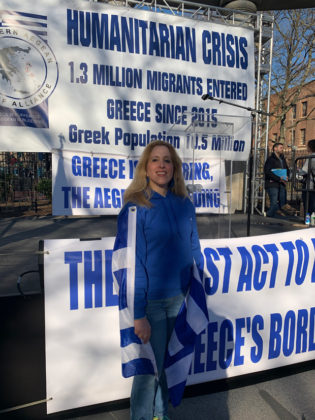
Stella proudly attended Migrant Crisis Rally organized by Norther Aegean Alliance on the eve of coronavirus
What helps prepare you to face this crisis?
What I think has prepared me the most to handle the daily onslaught of news regarding COVID-19 pandemic is actually my background in engineering. I thank my father who encouraged me to pursue undergraduate study in engineering. Understanding data and exponential curves helped me realize and prepare for the upcoming inevitable increase in disease spread. I chose to pursue a career in medicine so that I could apply my knowledge of science and technology to improve people’s lives and make them better. The war waged against the current COVID-19 pandemic can only be won if we apply science and technology to fight it.
What can people do to avoid unnecessary trips to the doctor and exposure from the virus?
The government and healthcare industry has adapted to this crisis with rapid technological developments to enable continuity of patient care safely expanding coverage by Medicare and private insurers to cover telemedicine visits. There is a massive telemedicine rollout happening across all hospitals and outpatient centers to get up to speed with telemedicine so that critical patient care can continue virtually and safely.
I hope that everyone while you are now at home that you take some time to contact your insurance and providers, download necessary apps and find out where you can schedule telehealth visits for yourself and your family. Medical care will continue but is rapidly being redefined and everyone needs to plan ahead in order to minimize unnecessary exposure to COVID-19 when they need medical care.
I am especially concerned that the elderly and people without computer access may be locked out soon from accessing medical care because of the increasing spread of the virus but am hopeful that as a community we can outreach and support each other through this crisis and look out for one another. Hellenic community organizations and parishes can play an important role here to contact their members and friends and especially the elderly to see if they need assistance, medication refills and help to coordinate virtual medical care.
Let’s switch gears now. As a woman proud of her Greek heritage, what are some of the Hellenic organizations you are involved with?
I am a proud member of the Hellenic Medical Society of NY and have served as Vice President and was founder of the Mary Kalopothakes Distinguished Women in Medicine Award, which gave its first award in 2011, that actually NEO magazine covered when we had our first conference at Memorial Sloan Kettering. I was very grateful to the HMS Board for embracing this proposal to recognize the contributions of Hellenic women in science and medicine. This year we awarded Dr. Antonia Ann Kolokathis who is an exceptional infectious disease physician with a long career in the pharmaceutical industry. Although we have to postpone the actual award ceremony scheduled for April, she has been active in educating the Hellenic community on the pandemic crisis so I recommend her advice on Hellas FM broadcasts in Greek.
I have also supported the HPW and AGAPW organizations and enjoy the camaraderie of being in the company of inspiring and energetic Hellenic professional women. Last year I was especially honored to be named woman of the year by AGAPW and I applaud their continued support of female Greek American students with scholarships.
You are also an outspoken proponent of Hellenism and a proud Hellene. Are there any other issues affecting Greece and its future that you would like to address?
Thank you for this important question. First of all, I am very impressed with the government response in Greece towards the Covid-19 pandemic. Prime Minister Mitsotakis has demonstrated impressive maturity implementing early effective measures with the “Meno sto Spiti” (I stay home) campaign and instituting more testing in the population that we have been able to achieve in the USA. For small Greece with limited resources this is impressive.
I am very concerned however with the migrant crisis in Greece and the developments in Evros, as well as the important issue of the migrants in Chios, Samos and Lesbos. I have been outraged with the biased media coverage in the US and around the world and the lack of accurate reporting of Turkey’s oppressive actions against Greece and especially Erdogan’s irrational rhetoric. I proudly attended the Astoria rally in early March organized by the newly formed Migrant Crisis Northern Aegean Alliance to educate the media, politicians and public about the Greek border crisis and was really moved and impressed by the ability of the young generation, especially the youth from Chios who played an important role in organizing the successful rally. I also applaud HALC and AHEPA in their efforts to mobilize action here in the US with their lobby efforts.
I cannot hide the fact that I was a little disappointed with the majority of the large professional and international Hellenic organizations and feel that we are not poised to take organized action when needed. March of course has been a challenging month to say the least as coronavirus has now dominated all aspects of our existence, however we need to urgently organize efforts to support Greece and unite as one voice against the current crisis facing Greece at the border and with the migrants, especially given the unsanitary dwellings at the Aegean islands.
The threat from Turkey is continuing despite the pandemic global freeze and Erdogan is a master manipulator of other countries and of the media. I hope that as Greek Americans we can better use all our resources to create an effective effort to stand up for Greece, whether we are children of the Greek diaspora or Greeks by citizenship. The Turkish threat and challenge of the migrants will not go away even as we face this pandemic. I hope that as a Greek community here in NYC we organize and become better prepared to assist Greece when called on to help from afar.

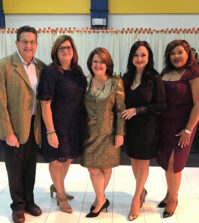


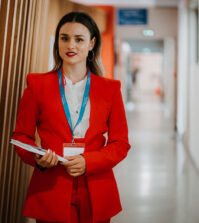










0 comments